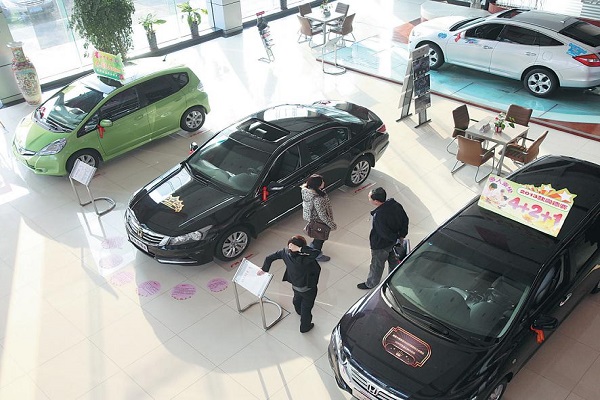Tianjin moves up the industrial ladder with business-friendly moves

Customers look to buy cars at a Honda store in Tianjin. [Photo provided to China Daily]
Tianjin is fast emerging as one of the most business-friendly cities in the nation in terms of business environment, public services and financial services, according to a new study.
According to the study conducted by China Media Group, the northern port city was ranked seventh in terms of business environment, third in public services and fourth for financial services.
Zhou Mi, a researcher at the Beijing-based Chinese Academy of International Trade and Economic Cooperation, a think tank under the Ministry of Commerce, said: "Tianjin has a well-developed infrastructure system, work on which started much earlier than most of its peers. The city has come out with several preferential policies aimed to ease the financing, operational and logistics burden of companies."
The city's continuous efforts in urban planning has made it a good incubator for businesses in both traditional and emerging sectors, he said. "More importantly, businesses from both sectors are creating a synergistic effect, which makes the city special for the Beijing-Tianjin-Hebei region and an integral part of the region's overall development," Zhou added.
The northern port city has increasingly been seen as a destination of choice for overseas and domestic businesses. It attracted 2,539 projects during the first six months of the year, with investment totaling 138.37 billion yuan ($20 billion). Tianjin Binhai New Area, a key industrial area in the city, is also home to 30,900 newly-established private companies.
Companies that are already registered in Tianjin include South Korea's Samsung, Japan's Toyota, and Germany's Volkswagen, all of whom have been increased their investments in the city this year.
Tianjin has also adopted an online business licensing mechanism which makes the entire filing procedure more simpler and easier. It has also eased regulations for startups aiming to create more room for their development.
"Companies were required to go to various offices and fill different documents to complete the licensing procedures, which was often a time-consuming and labor-intensive process," said Chen Pengyun, chairman of a Tianjin-based vehicle trading company.
"Things are much easier now with the online procedures," he said.
In addition, Tianjin has shortened procedures for approval of investment projects to currently 27 business days. Preferential policies have also been launched to make the entry of overseas business much easier.
Financial services is another sector that has seen a flurry of activity in Tianjin.
The city has set up a mechanism to ensure financing for small and medium-sized tech businesses, as they are less likely to get support from banks due to valuation and development concerns.
Prospective applicants are not required to furnish any collateral, but would need their projects to be certified by the relevant authorities.
"Tianjin is also taking moves to promote high-tech development," Zhou said, "It also benefits the manufacturing sector which the city has been known for, as many manufacturers have high-tech adaptations."
In the first half of 2018, the added valued of Tianjin's high-tech industries achieved a 6.8 percent year-on-year growth.
The Tianjin Binhai New Area, a key industrial area in the city, is already home to some top high-tech enterprises from home and abroad and playing a pivotal role in the city's upgrade plans.
Officials from Binhai New Area told China Daily that they have come out with a series of preferential policies to facilitate tech development, such as the Development Plan 2017-20, for the software and information technology industry. It is also setting up a 30 billion yuan fund to support the development of intelligent technologies.
Care has also been taken to upgrade the skills of small and medium-sized entrepreneurs in the high-tech sector through educational programs on management and operations.
"Most of the efforts have started bearing fruit and many companies from emerging sectors like artificial intelligence and big data have chosen to set up facilities in the city," Zhou said.
Invest in China Copyright © 2024 China Daily All rights Reserved
京ICP备13028878号-6
 京公网安备 11010502032503号
京公网安备 11010502032503号





